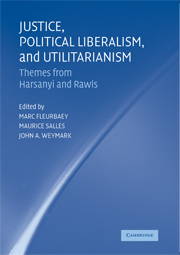Book contents
- Frontmatter
- Contents
- Preface
- List of Contributors
- 1 An Introduction to Justice, Political Liberalism, and Utilitarianism
- PART ONE THEMES FROM RAWLS
- 2 John Rawls's Theory of Justice: Some Critical Comments
- 3 Rawls, Responsibility, and Distributive Justice
- 4 Improving Our Ethical Beliefs
- PART TWO HARSANYI'S IMPARTIAL OBSERVER AND SOCIAL AGGREGATION THEOREMS
- PART THREE GOODNESS AND WELL-BEING
- PART FOUR SHARING THE GAINS FROM SOCIAL COOPERATION
- PART FIVE RIGHTS AND LIBERTIES
- Index
2 - John Rawls's Theory of Justice: Some Critical Comments
Published online by Cambridge University Press: 09 February 2010
- Frontmatter
- Contents
- Preface
- List of Contributors
- 1 An Introduction to Justice, Political Liberalism, and Utilitarianism
- PART ONE THEMES FROM RAWLS
- 2 John Rawls's Theory of Justice: Some Critical Comments
- 3 Rawls, Responsibility, and Distributive Justice
- 4 Improving Our Ethical Beliefs
- PART TWO HARSANYI'S IMPARTIAL OBSERVER AND SOCIAL AGGREGATION THEOREMS
- PART THREE GOODNESS AND WELL-BEING
- PART FOUR SHARING THE GAINS FROM SOCIAL COOPERATION
- PART FIVE RIGHTS AND LIBERTIES
- Index
Summary
What Choices People Would Make in Ignorance of Their Own Personal Interests
Both Rawls's A Theory of Justice, 1971, and my own theory of moral value judgments (see, e.g., Harsanyi, 1953, 1977, chapter 4) can be interpreted as theories that try to answer the question of what social institutions people would choose if their choices were wholly unaffected by their own personal interests.
In Rawls's theory, this question takes the form of asking what social institutions people would choose in the original position where a “veil of ignorance” would prevent them from knowing what their own social positions and even what their own personal characteristics were and therefore from knowing their own personal interests.
In my own theory, this question takes the form of asking what social institutions people would choose for their society if they had to make their choiceson the assumption that each of them would have the same probability n of ending up in any one of the n possible social positions.
Yet, even though the basic questions Rawls and I ask are rather similar, our theories by which we try to answer them are very different. One important reason for this is that Rawls assumes that people in the original position would use the maximin principle as their decision rule, whereas I assume that people making moral value judgments would base their choices on expected-utility maximization in accordance with the Bayesian concept of rationality.
The Maximin Principle
Rawls's use of the maximin principle as a decision rule is rather surprising because it has been known since the early 1950s that it is an irrational decision rule, with very paradoxical implications (see Radner and Marschak, 1954; see also Harsanyi, 1974).
- Type
- Chapter
- Information
- Justice, Political Liberalism, and UtilitarianismThemes from Harsanyi and Rawls, pp. 71 - 79Publisher: Cambridge University PressPrint publication year: 2008
- 4
- Cited by



